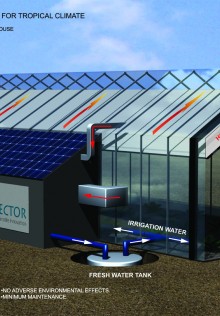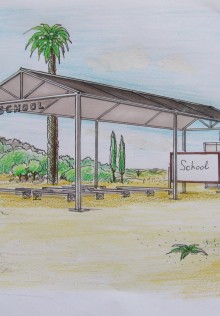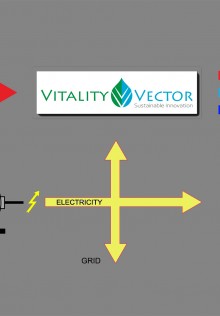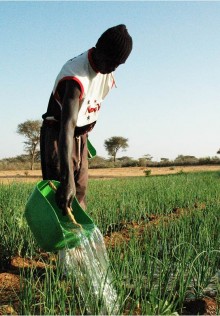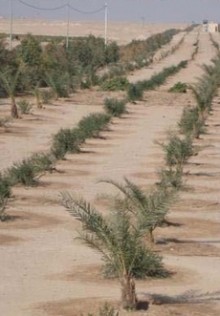-
Self-sustainable greenhouse system for hot and humid climates.
Development and growth possibilities of the world’s horticulture sector are threatened by high cost in maintaining greenhouse climate control and limited amounts of available water for irrigation. The quality of the irrigation water is also critical, since water-borne pathogens on crops can cause diseases such as typhoid and cholera.
There is a growing demand for sustainable food production even in the regions that do not have favorable conditions for crop cultivation, such as Middle East or Northern Africa. With that in mind, we have developed self-sustainable greenhouse system for hot and humid climates. We can cool a greenhouse and produce enough water for irrigation using mostly solar heat, which we recover by retrofitting the roof of the greenhouse to function as a solar heat collector.
The advantages of this system are self-evident. It makes it feasible to grow crops even in the regions that generally are considered to be hostile to cultivation. It also increases yield of the crops and the number of annual crop cycles, both of which are effected by temperature and humidity fluctuations, as well as lack of good quality irrigation water.
-
Self-Sustainable “Water For Schools” System
Our company pledges 10% of the profit towards providing clean drinking water to schools in poor communities in water scarce regions. These areas have an abundance of solar radiation, making our solar panel operated models to be completely self-sustainable.
The system consists of an array of flat plate solar heat collectors that form a canopy structure to create shade for a classroom and a water recovery system that can recover up to 800 litter of drinking water per day, using thermal energy absorbed by the solar heat collectors.
The other vital factor is that our fresh water extraction method has no adverse effect on the environment. There is no threat of contamination or salination of the ground waters that is commonly present in boreholes drilling projects.
The simplicity of the design and very low maintenance requirements are the other advantages of this technological process. It means that the local villagers do not need extensive training to operate or service the equipment.
-
RESIDENTIAL, COMMERCIAL, DATA CENTERS
Amidst the environmental crisis and the worldwide campaign to reduce energy emissions, the co-generation principle or CHP (Combined Heat and Power) have come into a spotlight. Co-generation is a principle of utilizing the waste heat, which is generally discarded during the production of electricity, as a source of thermal energy.
The Netherlands has long been a leader in implementing co-generation technology for residential, commercial applications as well as in the horticulture sector. The large apartment complexes, data centers, and greenhouse growers install CHP systems to simultaneously produce electrical and thermal energy, resulting in 20-40% savings. The advances in co-generation technology allowed for development of micro turbines as small as 3kw/h electrical output to use for small residential housing.
Vitality Vector technology can be coupled with either large CHP systems or small micro turbines to generate electricity and drinking water, as well as provide cooling in the summer and heating in the winter.DATA CENTERS.
The ICT sector accounts for almost 2% of the world electrical consumption and the cooling of data centers represents almost half of this energy. Almost 30% of the total operating cost of a data center is spent on keeping the equipment cooled. Traditionally, data centers are cooled by high energy consuming vapor compression technology, but the impending environmental crisis have transformed the search for alternative cooling methods into a quest for financial and environmental efficiency. There are many solutions with passive and evaporative cooling systems that have been considered or implemented, but the sensitivity of the IT equipment to the air quality and temperature has made it difficult to avoid using the conventional cooling systems entirely.
-
RURAL COMMUNITIES
Many households in rural areas rely upon producing and eating their own food. Unpredictable seasonal rains causing dry periods at critical stages in the cropping cycle can regularly decimate their production, leading to food shortages.
Our technology powered by solar heat can significantly reduce the reliance of rural communities on the seasonal rain.EMERGENCY RESPONSE AND HUMANITARIAN AID
Immediate access to clean drinking water is essential in saving lives in disaster struck areas, since many conventional water sources become contaminated.
Low cost, minimal maintenance and clean technology makes it indispensible for Emergency Relief and Humanitarian Aid programs. -
Other Uses
* Reversing Desertification
* New Construction Development Projects
* Hospitals
* Schools
* Hotels and Resorts
* Personal and Cooperative Use
